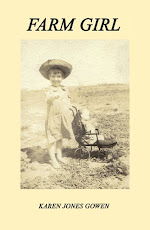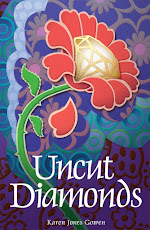I have postcards written by my grandmother in the early 1900's. The handwriting is a bit difficult to decipher but worth the trouble, as it gives a clue to what mattered to her. Who visited, what gifts she received at Christmas, what was served at a special dinner. These are the kinds of details that are precious gems when writing from life. Because our memories can't be trusted. But letters, diary entries, and photographs can keep the accurate record of daily activities. Even a grocery list from 50 years ago can be a valuable resource.
Gone are the days when people communicated via letter. Unless you have a son or daughter at boot camp, that is. So this topic gives me an excuse to share some precious letters that arrived at my house this week. They're from my 18 year old son who's been at Marine boot camp in San Diego for 3 weeks. Each segment tells a little story:
Dear Mom and Dad,
"I have only wondered why I am here a few times, and only on certain hours of really bad days. Overall it isn't super duper bad. Today we got haircuts, and the barbers are super angry Italians who have no idea how hard they are pressing that razor against the heads of recruits."
"Today we practiced drill with rifles and it was pretty sweet, but holding an 8 pound gun right in front of you for an hour is super exhausting."
"I have yet to be IT'd, which is where a drill instructor takes you aside and makes you do pushups/situps/jumping jacks and running in place while he is yelling at you and making you shout things."
"DI's hate whistling more than Mom does. Getting caught whistling is like condemning yourself to only eating steamed carrots for time and all eternity."
"The one thing I will look forward to when I get home other than the lack of swearing, abundance of females, no more group showers and eating a Snickers, is taking my time while eating and not getting shouted at while eating."
From these letters, I'm getting a picture of what it's like for him at Camp Pendleton. Sometimes I wish email and cell phones had never been invented. It's convenient and cheap sure, but it has turned letter-writing into a rare thing indeed.
Another letter came today! Here are more excerpts from Recruit Gowen:
Dear Mom and Dad,
"Who would have guessed that drill instructors say 'heinous'. I don't even know how to spell that word." (Yes, he did spell it correctly!)
"Grandma's house is great and I love it here. (When he was preparing to leave, I couldn't say 'boot camp' so I said he was leaving for 'Grandma's house.') I get to drink apple juice every day and I get pudding almost every day. I sure wish that I had eaten a Snickers before I left because I have wanted one since Day 1, so don't forget to bring one to my graduation."
"I decided that my last letter lacked stories and adventure, so I will tell you about my adventures today. I spit up blood, did push ups on a red ant hill, learned about Marine Corps history, ate pudding and did drills. One of the best times was when a few of us recruits were cleaning outside, then a DI jumped through an open window to tell us that we were moving too slow."
I'll admit I had tons of anxiety about my youngest boy going to Marine Boot Camp (which is why I called it 'Grandma's house') but after getting these letters, I am comforted and even entertained. I know he's doing well. And the letters he gets from home will keep him going strong.
This post brought to you by the proud parent of a U.S. Marine

.JPG)











